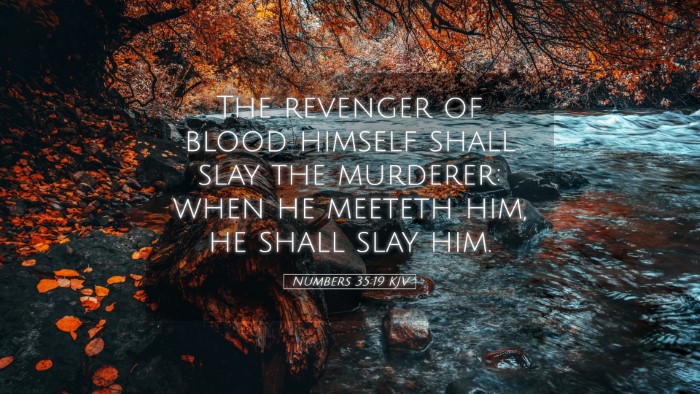Commentary on Numbers 35:19
Numbers 35:19 states: “The revenger of blood himself shall slay the murderer: when he meeteth him, he shall slay him.” This verse addresses the grave issue of capital punishment and the legal systems in ancient Israel, specifically regarding the cities of refuge and the role of the avenger of blood.
Contextual Background
The book of Numbers lays out the laws and regulations governing the Israelites as they journey through the wilderness. Chapter 35 is particularly focused on the cities of refuge, which were established for individuals who accidentally killed someone, allowing them a place of protection from the avenger of blood until a trial could be conducted.
Interpretation of "Revenger of Blood"
According to Matthew Henry, the term “revenger of blood” refers to a close relative of the deceased whose responsibility was to seek retribution for the wrongful death. This idea underscores the weight of personal responsibility in maintaining justice within the community. The importance of maintaining societal order is emphasized, revealing the severity with which such crimes were regarded.
- Henry elucidates that this custom reflects the ancient practice of blood vengeance.
- He notes that while justice is necessary, the laws also provided mechanisms for mercy through the cities of refuge.
Theological Insights
Albert Barnes remarks that this system, wherein the avenger could legally kill the murderer, illustrates God’s justice as morally absolute yet balanced with grace. The establishment of cities of refuge indicates God's desire for justice tempered with mercy, permitting accidental killers to seek asylum rather than face immediate death.
- Barnes highlights how the Israelite justice system is designed to uphold both societal order and the significance of individual lives.
- The responsibility of the avenger of blood signifies the communal aspect of justice, reflecting the interlinked social relationships within tribes.
Legal and Cultural Implications
Adam Clarke provides a detailed analysis of the cultural context surrounding this law. He notes that the responsibility placed on the avenger of blood created a sense of duty not only to the deceased but also to the family and community. In this light, the execution of justice was seen as a collective responsibility rather than merely an individual act.
- Clarke comments on how such practices underline the high value placed on human life in the Hebrew Scriptures.
- He also mentions the broader implications for modern legal systems, questioning the nature of justice and retaliation in contemporary society.
Practical Applications for Today
The complex nature of justice as presented in Numbers 35:19 continues to resonate in theological discussions today. Pastors and theologians are encouraged to reflect upon the implications of retribution and forgiveness within their communities. The balance between justice and mercy is a theme that invites deep reflection in church teachings and community practices.
- Pastors can explore the theme of mercy as a reflection of God’s character, emphasizing that while justice is necessary, mercy speaks of deeper grace.
- The verse raises questions about how communities today deal with issues of crime, punishment, and forgiveness.
Conclusion
Numbers 35:19 encapsulates significant themes of justice, societal responsibility, and the complex interplay of vengeance and mercy. The insights drawn from the work of commentators like Matthew Henry, Albert Barnes, and Adam Clarke can inform modern discussions on these themes.
The call towards justice is timeless, and the reflection upon mercy remains critically relevant as communities navigate the challenges of maintaining order while extending compassion. As theological students and scholars engage with this text, it provokes essential inquiries into our understanding of divine justice and the moral responsibilities we hold towards one another.


